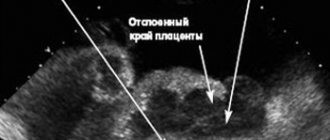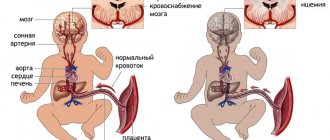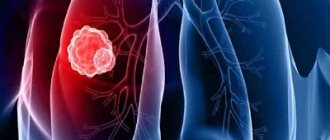Causes of toxicosis
The term toxicosis comes from the Greek word toxin, which already carries the definition of this condition. This symptom complex occurs in pregnant women due to the impact on their body of endogenous substances with foreign properties.
An intensively growing embryo is only half genetically identical to the mother's body, so the immune system tries to protect itself by rejecting it.
In addition, with the onset of pregnancy, an intensive restructuring of the functioning of all the woman’s organ systems occurs, which in itself is a stressful condition. The body of the expectant mother needs to start working to ensure not only its vitality, but also to supply the growing life with all the necessary nutrients, vitamins, minerals, oxygen, and also remove its waste products. Such high demands unbalance the functioning of all organ systems for many months.
In addition to the above features, it is important to note that the expectant mother must also protect the life developing inside her. Exogenous toxic substances that are dangerous to the growing embryo, coming from inhaled air, ingested food, through the skin and other routes, can cause a whole range of symptoms. Thus, intoxication in pregnant women is just a defensive reaction designed to protect the developing baby from danger.
However, intoxication of the body (due to the fact that the placenta has not formed in the baby, and the woman begins to receive 2 times more toxins than before) in the first trimester of pregnancy is the main cause of toxicosis
Does maternal age affect toxicosis problems?
Now that more and more women are choosing to give birth in middle age, many are interested in whether this moment aggravates the course of toxicosis. It is impossible to answer this question unequivocally. But, according to doctors, the main problem of late motherhood is the state of health. The fact is that with an increase in the biological life of our body, chronic diseases worsen, the general condition worsens, which can provoke a moderate and even severe form of toxicosis. Accordingly, the possible risk of certain problems is influenced not by age itself, but by health status.
Signs and symptoms of toxicosis
Signs of developing toxicosis include not only the classically described vomiting, but also:
- Loss of appetite.
- Mood swings.
- Depression, apathy.
- Weight loss.
- Sleep disturbance.
- Dizziness.
- Nausea and vomiting.
- Headache.
- Prostration.
- Drowsiness.
- Irritability.
- Tearfulness and nervousness.
- Change in taste preferences.
- Increased salivation.
- Dry skin.
- Decreased blood pressure, increased heart rate.
Remedies for toxicosis during pregnancy
There are many different treatments for toxicosis. But not all of them are harmless, safe and effective. So, we repeat again: it is better not to start the disease.
Drug treatment. Among all the medications used to treat toxicosis (and there are about 20 of them), only no-spa, vitamins and microelements are to a certain extent harmless during pregnancy. The rest are very dangerous and toxic. But in certain conditions it is necessary to resort to their help - when the benefit of such treatment for the mother outweighs the potential risk to the fetus. Drug treatment of toxicosis must be comprehensive and include a number of different drugs. Such treatment is always carried out in a hospital setting, but, unfortunately, is not always successful.
Usually, if treatment was started on time, toxicosis passes successfully and the woman is discharged. But in rare cases there is no improvement:
- vomiting does not stop;
- dehydration of the body increases;
- body weight loss progresses;
- acetonuria progresses over 3-4 days;
- severe tachycardia is observed;
- the functions of the nervous system are impaired (adynamia, apathy, delirium, euphoria);
- characterized by icteric staining of the sclera and skin.
This condition of a pregnant woman is an indication for termination of pregnancy. But, fortunately, today this happens extremely rarely.
Immunocytotherapy is a modern invasive treatment method. It consists of injecting lymphocytes from her husband into the skin of her forearm. Improvement in the pregnant woman's well-being usually occurs within 24 hours. Immunocytotherapy also requires hospitalization and even a thorough examination of the child's father for infections (hepatitis B and C, HIV, Wasserman reaction). But this method is still dangerous: there is a risk of contracting hepatitis, for example.
Toxicosis in the first trimester
With the onset of pregnancy, almost 90% of women face toxicosis problems. This should not be alarmed, but it should not be considered the norm. You need to learn how to minimize the discomfort from toxicosis in the first weeks of pregnancy, for which it is best to consult a gynecologist. Only a specialist will help you select competent complex therapy, which will not only improve the quality of life of the expectant mother, but also significantly reduce the risks of complications in later weeks of pregnancy.
Toxicosis has now become almost a sign of pregnancy, its symptoms have become so frequent. However, toxicosis is not the norm, but a pathology. Most often, manifestations of toxicosis can be noticed during the first 3.5 months of pregnancy. Experts suggest that this is due to the beginning of a new mode of operation of the woman’s body. During this period, global changes occur in the functioning of the digestive tract, excretory, circulatory, and immune systems. The unborn child is actively developing, giving the mother products of its vital activity, which are essentially endotoxins.
Also, powerful hormonal changes occur in the female body, aimed at preserving and maintaining pregnancy. Changes in hormonal levels invariably lead to disruption of normal well-being and the appearance of symptoms of toxicosis. But don’t worry if the cause of the illness is only a hormonal storm. Hormone levels are sure to stabilize by the beginning of the 2nd trimester of pregnancy.
The psychological discomfort of the expectant mother can also be associated with the appearance of toxicosis in the early stages. A woman is not always psychologically ready to accept herself as a mother here and now, and not someday, in the near future. In addition, there may be an aversion to the not-so-pleasant consequences of pregnancy: the birth process, sagging skin, excess weight, etc. Because of such thoughts, the expectant mother may become upset, then the baby’s psychological alienation involuntarily appears, and the female body perceives the nascent life as an extremely foreign object, giving symptoms of severe intoxication.
As a rule, at the end of the first trimester of pregnancy, signs of toxicosis appear less and less, and then disappear altogether. The explanation for this can be found in the completed formation of the placenta, an organ that is essentially a buffer between mother and baby. The placental barrier not only protects the child from the aggressive effects of substances from the outside world, but also significantly reduces the toxic load on the mother's body.
There is a conditional classification of this painful condition. There are 3 degrees:
- 1st degree. It is considered almost normal if a pregnant woman in the first months of her pregnancy experiences weakness, dizziness, nausea, and vomiting occurs 1-2 times a day.
- 2nd degree. With this degree of toxicosis, vomiting occurs up to 15 times a day. The woman’s quality of life drops significantly; it is necessary to begin treatment.
- 3rd degree. This is a very serious condition of a pregnant woman, in which vomiting can occur more than 20 times a day. Dehydration occurs and miscarriage is possible. Urgent hospitalization of the woman is necessary, since in the hospital there is a chance not only to reduce the manifestations of toxicosis, but also to preserve a normally developing child.
Diagnostics
Making a diagnosis is not particularly difficult and is based on a survey of the patient and her complaints. To determine the severity of toxicosis, a woman will need to undergo a general blood and urine test and a biochemical blood test.
If toxicosis is mild, test results should be within normal limits. With moderate toxicosis, the number of leukocytes and hemoglobin levels increase. The density of urine increases, and acetone can be detected in it.
The severe form in the early stages is accompanied by significant deviations from the norm in test results. Blood tests show decreased levels of glucose, protein, and ESR. Ketone bodies appear in the urine.
Toxicosis in the second trimester
Toxicosis can also appear in the second trimester of pregnancy. In this case, its symptoms change slightly, which is associated with a more specific cause of toxicosis - a not entirely healthy maternal body.
Toxicosis in the 2nd half of pregnancy manifests itself mainly if:
- a woman over 30 or under 18 years of age;
- there are inflammatory diseases of the reproductive and urinary systems;
- there is a predisposition to diseases of the cardiovascular system.
It is worth highlighting several diseases of pregnant women, united by the term toxicosis:
- dropsy,
- preeclampsia and eclampsia,
- nephropathy,
- more rarely encountered - dermatoses, jaundice, tetany, generalized osteomalacia.
Modern researchers have come to the conclusion that signs of toxicosis after 15-16 weeks of pregnancy appear as a result of a disruption in the functioning of all organ systems of the female body, and primarily this concerns the functioning of the kidneys!
The main criterion for the severity of this pathology is the degree of disruption in the functioning of the central nervous system, since it is it that regulates the functioning of other organs. Mainly, improper regulation of the vascular bed by the nervous system leads to insufficient blood supply to all parts of the body, which is why there is an imbalance in the woman’s body and its autointoxication. Then functional disorders in the urinary system begin to appear, which leads to edema, increased blood pressure, and deterioration of the rheological properties of the blood. All this can negatively affect the development of the child, who does not receive enough oxygen, nutrients, and the properties of the amniotic fluid, its contamination.
If toxicosis continues after the 14th week of pregnancy, you should immediately consult a doctor. It is necessary to immediately begin treatment for this condition, since it already poses a danger to the health and life of the mother and fetus. Do not delay your visit to a specialist: the sooner comprehensive treatment begins, the more likely it is that severe symptoms of late toxicosis will be eliminated.
Attention! Swelling during pregnancy is not a reason to stop drinking regular clean water! At a minimum, you should continue to drink at least 1.5 liters of water per day, as this is a physiological need.
Prevention
Against the background of early toxicosis in pregnant women, severe dehydration and multiple organ failure with impaired liver, heart and kidney function may occur. A fatal complication can be the development of yellow liver atrophy. Patients with severe toxicosis often experience miscarriage.
In most cases, manifestations of early toxicosis in pregnant women subside by 12-13 weeks of pregnancy. In case of prolonged course of early toxicosis, it is necessary to exclude combined (hepatitis, pancreatitis) and obstetric pathology (hydatidiform mole, hepatosis).
Prevention of toxicosis is facilitated by responsible preparation of a woman for pregnancy, including timely treatment of chronic pathology, maintaining a healthy lifestyle, refusal of abortion, etc.
Toxicosis in the third trimester
Toxicosis in the 3rd trimester of pregnancy is a condition called gestosis that threatens the health of the woman and the child she is carrying.
Signs of gestosis may be:
- excessive weight gain during pregnancy;
- high blood pressure;
- swelling of the limbs and face;
- frequent dizziness, severe headaches;
- muscle cramps;
- loss of consciousness;
- persistent peeling of the skin, rash.
Toxicosis in the last months of pregnancy is also dangerous because it can occur hidden. This means that there will be swelling of the tissues of the internal organs, and the amount of protein excreted in the urine will increase, which can only be determined in the laboratory.
To determine the diagnosis in this case, timely and dynamic monitoring of the pregnant woman is very important. This is exactly what gynecologists do in antenatal clinics, which is why early pregnancy registration is mandatory. Taking urine samples every 1-2 weeks is extremely important to identify latent gestosis and promptly treat it.
A pregnant woman needs specialized help when determining toxicosis in the third trimester of pregnancy. The most reliable option would be urgent hospitalization in the antenatal department, where doctors will carry out not only therapeutic measures, but also daily monitoring of the child’s condition.
In severe forms of gestosis, urgent surgical care or a caesarean section may be required at any time, saving the life of the baby and the woman in labor. We must not forget that with an increase in blood pressure, the development of severe edema and general malaise in a pregnant woman, the child growing in her womb not only does not receive enough necessary nutrients, but also experiences discomfort. A stressful state during a baby’s prenatal development has a detrimental effect on his life and health in the future.
How to prevent
The better a woman’s health, the more successfully her body copes with increased stress, the greater the likelihood that toxicosis will be insignificant or absent altogether.
There are ways that can alleviate your condition. Your family should also take part in this, from the earliest stages to childbirth:
- walks in the fresh air, especially before bedtime;
- no smoking in the room where the pregnant woman is;
- when reacting to food odors, protect the woman from kitchen work as much as possible;
- if you experience nausea, drink a sour compote or fruit drink; in addition, these are also useful vitamins.
If toxicosis has not bypassed you, this does not mean that you should endure it resignedly, suffering and waiting for the end of pregnancy. In any case, you should consult your doctor for advice.
Treatment of toxicosis
Signs of toxicosis, according to many scientists and doctors, have become more frequent due to a significant decrease in the level of general health of women of childbearing age. This is quite logical. The weakened organ systems of the expectant mother receive an additional very large load in the form of a developing embryo. And all this happens against the background of an unbalanced diet, bad habits, constant overwork, healed infections, depressive states, etc.
But all of the above is only a small part of the iceberg called toxicosis. Before starting treatment for toxicosis, you need to think about timely strengthening of the health of the expectant mother. Even when the first symptoms of toxicosis are identified, competent comprehensive strengthening of the immune system, nutritious and sufficient nutrition can significantly improve the general condition of the pregnant woman. But first things first.
As mentioned above, one of the causes of toxicosis is the many times higher load on the mother’s body. At the same time, all organ systems begin to experience stress and energy starvation. Thus, with the manifestations of toxicosis, the body seems to tell the woman that it needs outside support.
First of all, it is necessary to replenish the reserves of nutrients, vitamins and microelements necessary for both the female body and the developing embryo. For this, there are a lot of special vitamin complexes for pregnant women, which must be supplemented with vitamin E and folic acid, since they are extremely important in the first weeks of pregnancy for the proper formation and development of organ systems in the child. In addition, with their latent deficiency, severe disorders occur in a woman’s body.
It is worth remembering about a rational daily routine. The increased load on the female body must be compensated for by adequate and long sleep, a proper daily routine, and a balanced diet. It is highly advisable to give up smoking, drinking alcohol and other bad habits. In addition to harm to the female body, they undoubtedly will not bring anything useful to the development process of the embryo. Long walks in the fresh air, on the contrary, will not only eliminate most of the symptoms of early toxicosis, but will also lead to an optimal oxygen content in the vascular bed of the expectant mother, which will have a positive effect on her well-being and the development of the child.
If it is impossible to eat rationally, women can use special dry milk formulas, the variety of which on the market will satisfy any needs. By choosing such a product, the expectant mother will provide herself and her child with the necessary and sufficient set of nutrients. This means that the manifestations of toxicosis will significantly decrease, not to mention reducing the risk of late intoxication complications.
Treatment of toxicosis at any stage of pregnancy requires an integrated approach. It is necessary to contact a specialist who will conduct a manual examination of the pregnant woman and prescribe laboratory screening. Only with the results of these studies should the doctor prescribe individual treatment, which is important for the pregnant woman to strictly follow. At the same time, it is also useful to maintain your body with the correct rhythm of life, to avoid overwork, lack of sleep, and abuse of bad habits.
General recommendations
Experts also give general recommendations for eliminating signs of toxicosis:
- It is necessary to drink 0.5 water immediately after waking up, even if you suffer from edema! This is very important for reducing hematocrit and normal kidney function.
- You should not quickly jump out of bed; actions and movements should become smooth and calm.
- You need to rest more, sleep at least 8-10 hours every day.
- Fractional nutrition is recommended, which means eating food in small quantities, but often.
- Need to drink more. Freshly squeezed juices, fruit drinks, various weak teas, and still mineral water are best suited for this. The volume of clean water (not counting tea and coffee) should be 1.5 liters per day.
- It is very useful to review your diet, eliminating fatty, smoked and other low-health foods. You should also avoid excessive consumption of mayonnaise, ketchup, and confectionery.
- Adding fresh vegetables and fruits to the diet has a positive effect on the digestion of a pregnant woman.
- Walks in the morning and evening for 20-30 minutes in the fresh air are required. The room must always be ventilated to prevent hypoxia!
- Eliminate stress and unnecessary worries from your life.
You can also alleviate the symptoms of toxicosis with folk remedies, but it is important to “know when to stop.”
For example, herbal teas (with lemon balm, nettle) can eliminate morning sickness. Aromatic oils of chamomile and mint will help overcome attacks of toxicosis. A slice of fresh lemon or a slice of pineapple will also help relieve morning symptoms. You can not only eat such teas and fruits, but also simply keep them on hand so that if you feel unwell, you can simply inhale their aroma.
In addition to general recommendations and prescriptions, the attending physician must begin comprehensive treatment of toxicosis in a timely manner. For mild illnesses, preventive measures usually help, but if the quality of life of a pregnant woman has seriously decreased, medications must be prescribed.
Therapy for toxicosis is mainly aimed at improving metabolic processes, reducing intoxication and normalizing the general condition of patients. Thus, basically all drugs will affect the liver, kidneys and gastrointestinal system. Medicines, which have no contraindications for pregnancy, are based on herbal components, the action of which, among other things, improves tissue trophism and placental blood flow. Don't neglect taking them! Properly selected therapy will not only help eliminate signs of toxicosis, but also reduce the risk of late complications of pregnancy and childbirth.
The stronger the manifestations of toxicosis, the more targeted its therapy should be. In late pregnancy, the best treatment option is intravenous administration of a complex of medications and daily monitoring of the child's condition. Staying pregnant women in a hospital is the optimal solution for gestosis and a guarantee of timely medical care.
Chophytol to treat symptoms of toxicosis
Hofitol is a modern herbal preparation, often prescribed to pregnant women at the beginning and end of pregnancy for the treatment and prevention of toxicosis.
It is based on an aqueous extract of field artichoke grass and vitamins B, C, inulin and carotene. This is a safe drug that does not have any effect on the fetus, the use of which will improve metabolic processes in tissues and organs.
Indications for the use of Hofitol are quite extensive:
- liver diseases – chronic hepatitis, hepatosis, cirrhosis;
- dyskinesia of the choleretic ducts;
- diseases of the excretory system - chronic renal failure, nephritis;
- atherosclerosis of the vascular wall;
- acetonemia;
- chronic intoxication of the body.
Based on the list of indications, Hofitol is prescribed as a drug for complex therapy. It significantly relieves the liver, has a diuretic effect, and normalizes the functioning of the bile ducts. Thus, intoxication of the body is reduced, the removal of excess water from cells is facilitated, which means that the body is cleansed, which leads to the elimination of most symptoms of toxicosis, a decrease in fetal hypoxia, and an improvement in the supply of nutrients to it.
Based on this, gynecologists often prescribe Hofitol as a prophylactic agent. Do not panic, this drug will not harm a developing child. As an additional drug, it will improve placental blood flow and tissue trophism, which will have a positive effect on the physiological development of the baby.
When symptoms of toxicosis and gestosis are detected, the prescription of Hofitol is justified by the good dynamics of its use in pregnant women. It relieves the organs of the digestive and excretory systems, helping the body quickly adapt to the new state. Moreover, its use improves the condition of the vascular wall, which leads to an optimal supply of nutrients to tissue cells and increases the percentage of their absorption by the body. In the later stages of pregnancy, tissue swelling decreases, protein excretion in the urine normalizes, and, consequently, blood pressure drops to normal levels and headaches stop.
Essentiale in the complex therapy of toxicosis
The drug Essentiale has proven itself to be excellent. Its action is aimed entirely at the liver: it restores the structure of hepatocytes and stimulates their work, preventing the formation of connective tissue. Essentiale easily copes with intoxication of the body, regulating liver function, and improves lipid and carbohydrate metabolism.
Taking it during pregnancy will not only significantly reduce the symptoms of toxicosis in the body, but also optimize placental blood flow. Also, the phospholipids included in Essentiale have a beneficial effect on the metabolism in a woman’s body, which undoubtedly benefits the baby growing in her belly. The drug contains herbal ingredients that are absolutely safe for a pregnant woman and her child. Very rarely, phenomena of intolerance are possible: dyspeptic disorders increase.
Taking Essentiale during pregnancy is necessary on the recommendation of a doctor. Only a specialist can choose the correct dosage and method of use of the drug.
Cerucal for symptoms of toxicosis
The drug Cerucal has a pronounced antiemetic and anti-hiccup effect; it is a chemical agent. The mechanism of its operation is simple: it blocks signals from the receptors of the gastric mucosa, the vomiting centers in the brain do not react, and food masses continue to be digested, entering the intestines. This is an excellent remedy for exhaustion of the body and the inability to digest food.
The use of Cerucal during pregnancy should be justified, strictly in consultation with the attending physician, since by blocking receptor signals, it simultaneously stimulates the muscular activity of the digestive system. Activation of intestinal muscle tone can be transmitted to the wall of the uterus, which will lead to contractions and expulsion of the fetus. Cerucal should be taken with caution in the first 12-14 weeks of pregnancy, then its use becomes much safer due to the reduced risk of spontaneous termination of pregnancy.
But it is worth keeping in mind that by stimulating the gastrointestinal tract, Cerucal promotes excess accumulation of salts and water in the body. If there is gestosis in late pregnancy, it is better to use another drug with a similar effect.
Enterosgel for getting rid of toxicosis
It is called a cure for all diseases, this, of course, is not entirely true, but there is always a certain benefit from Enterosgel. This is a very well-proven enterosorbent based on methyl silicic acid. This drug does not linger in the body, but quickly moves through the digestive tract, absorbing and carrying with it a huge number of toxic substances, pathogenic microorganisms and their metabolic products. The positive properties of Enterosgel include:
- removal of toxins,
- elimination of rotting and gas formation processes,
- stimulation of intestinal muscle activity,
- activation of parietal digestion,
- cleansing from pathogenic microorganisms,
- positive effect on liver and kidney function,
- cleansing the intestinal mucosa and preventing ulcer formation.
Taking Enterosgel during pregnancy significantly reduces the manifestations of toxicosis, normalizes the functioning of the digestive system, and improves the general condition of the body. The drug does not enter the bloodstream, so it is absolutely safe for the intrauterine development of a child. The only negative property of Enterosgel is the possibility of constipation in the first 1-3 days of use, which is easily eliminated. Consult your doctor.
Pregnancy is a process of restructuring the body, the successful development of which often requires outside help. You can minimize many unpleasant moments with early preparation for this unusual condition. The purpose of the preparatory stage is to prevent pregnancy complications, which include toxicosis. It is worth taking care of prevention 3-6 months before conception; a competent specialist will help you with this. Taking a complex of vitamins, a balanced diet, the correct rhythm of life, and the cure of chronic diseases will contribute to the successful onset of pregnancy, its physiological course and the absence of complications.
Medicines for nausea and vomiting
Most medications are contraindicated for expectant mothers, but there are pills for toxicosis in early pregnancy. Harmless valerian, No-spa and microelements are used. Sometimes prescribing a suitable vitamin and mineral complex helps alleviate the condition. Therapy must be comprehensive, therefore, such remedies for toxicosis in the early stages as “Cerucal”, “Enterosgel”, “Essentiale” and others are indicated. In some cases, it is necessary to use more serious drugs that potentially threaten pregnancy. If, in the absence of therapy, a miscarriage may occur, then doctors prescribe such treatment.












